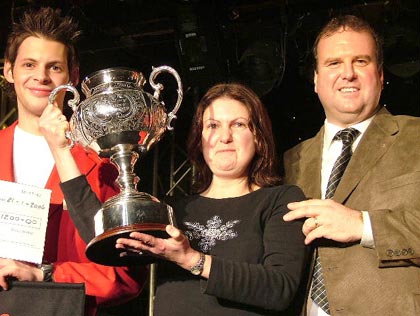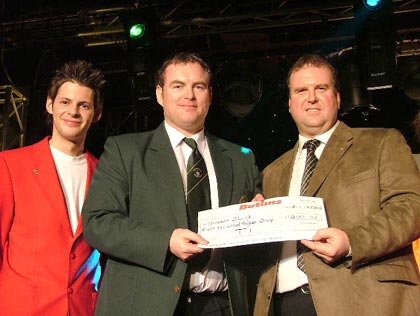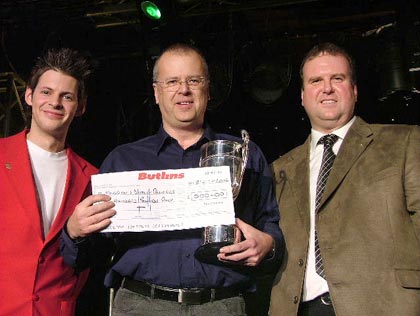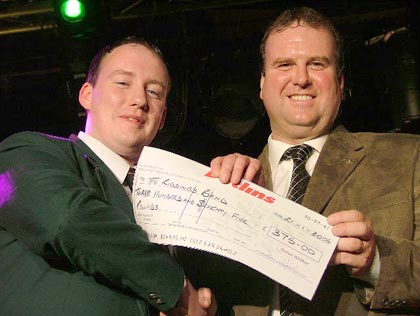2006 Butlins Mineworkers Open Brass Band Festival - First Section retrospective
25-Jan-2006It was Haverhill and Mark Ager who came out of the musical wash whiter than white with their Purcell mix and took the top prize in the First Section.

Purcell White - Sam Keefe of Haverhill shows off the trophy
Music from the pen of the talented Peter Meechan was heard for the first time competitively on Saturday morning courtesy of his ‘Purcell Variants', a clever piece of writing inspired by the beauty of Purcell's music for the funeral of Queen Mary.
Peter holds the position of ‘Composer in Association' at Black Dyke (who gave the World Premiere of the work in September 2004 at the Great Northern Brass Arts Festival) and listening to this composition alone, gave an insight into why he is currently seen as one of the brightest young talents in the compositional world of brass.
This was Purcell with a modern twist, with many of Peter's creative musical influences fully apparent and explored within the three movements of the work: jazz, dance, funk and acid house have been brilliantly mixed with hints of baroque and classical forms to create a fascinating musical picture.
The winning formula on the day though was consistency – the ability to put three balanced movements together to master all those individual facets of inspiration in turn, and in all honesty, (in our opinion) only the top four bands achieved this. This is a testing work for sure, but one that should be within the capabilities of a solid first section band. Why so many of the field fell short may be a bit of a mystery, but as one seasoned observer remarked, it was more of a case of Persil rather than Purcell in many performances – and not many came out of the musical wash whiter than white.
In fact, adjudicators Steve Sykes and Raymond Tennant probably weren't stretched too much in how they ranked the bands, because outside of the top four, they heard performances that fell quite neatly into rank – from the decent to the poor and then to the very poor. It all made for a rather disappointing contest and made you wonder whether the great majority of the bands here were closer to being good Second Section bands rather than potential poor Championship ones.
It was the very opening of the work that perhaps gave the clearest indication whether or not the band and their MD could get to grips with the music.
The simplistic beauty of the Purcell theme was set out clearly, yet so many bands could not come to terms with it. It required balance and security in the main line and with the shock notes, but all too often one or the other didn't match. The cornet quasi cadenza was another litmus test that few overcame. Marked ‘freely' it still had to make musical sense, but far too many players charged at it like a bull at a gate only to go into reverse gear when it came to the tricky triplet leap up to the top A. When someone did measure it perfectly it shone with class and understanding. And all this within the first 30 or so bars.
Every single band suffered towards the end of the first movement (featuring muted cornets in a reprise in detached crotchets of the opening thematic statement). It was so simply written that it begged to be played in just such a way, but time and time again the MDs thought there was something there that wasn't immediately apparent to those following the score in the box, and tried to make something of nothing. The results were at times catastrophic.
The second movement too allowed the bands to display their skills from the opening bars – a simple last post reprise from cornet joined by soprano. Yet again poor intonation and mechanical production robbed the music of its elegiac quality.
Finally the third movement with its dislocated rhythmic structure which finally resolves itself into a reprise of the original theme, but with that modern twist. Just a handful captured it just right – many opted for speed, where speed wasn't required, whilst other opted to blow, blow and blow again to try and inject misplaced excitement. To hear a beautiful Purcell melody played in such a crude manner at times left you wondering if some of the conductors had ever hear a note of any of the great man's compositions.
Consistency then was the key to success or failure on the day, and the bands that featured in the prizes coped sufficiently well to maintain their standard of performance throughout.
Haverhill were the last band on, playing number twelve and their overall approach and quality of sound was very good indeed. They didn't take any risks with the tempo's at all, and produced a nice band sound, accomplishing the exposed parts of the score. By the conclusion it was clear they would feature, but it was the end of the first section and start of the second section that wasn't as precise (for us) as the eventual second placed band, but not for the first time, we were proved wrong and they gained the valuable nod of approval from the men that count in the box.
Conductor Mark Ager was one MD who certainly had an understanding of Purcell and had clearly done his homework on the piece. There was balance and compactness to the opening statements, an elegiac sense to the second movement with some neat euphonium work from Richard Pannell and soprano Gavin Bowyer and a refinement to the final section where the MD kept control of both the dynamics and the tempos.
Mark was clearly delighted that after coming runners up here last year they had gone one better this time around. "We are all delighted", he told 4BR after the results. "This win was certainly down to a great deal of hard work and preparation. We enjoyed the piece very much but we thought we played very well with the soloists in particular doing a great job. This really sets us up for the Regional Championships, as we now know how much work we need to put in on an even more difficult piece." Haverhill will head to Stevenage full of confidence for sure – a confidence that will not be misplaced either.
Marsden Silver (Riverhead Brewery) entered the contest having been voted by 4BR readers as ‘Lower Section Band of the Year' for 2005, and as any football manager will testify, as soon as you get an award for your achievements, teams (or in this case a band) will lose next time out. 
Pipped at the post - Marsden take the runners up spot
In fairness though, Marsden and Glyn Williams were very unlucky on the day to finish runners up, as they produced a performance that really did the hallmarks of a band that sounded as if it could compete comfortably in the Championship Section. As with Haverhill, it was thoroughly prepared with every detail addressed, although in the middle movement the percussion didn't seem to be coming through as it could have done whilst the final section was taken at a spirited tempo to say the least.
The band certainly maintained its form from the word go, with some classy cornet work from Jason Evans, neat soprano playing from Andrew Lofthouse and a lovely euph in Matthew Stringer. It was that final movement though that may have caused consternation in the box, and although it was certainly well played, it did lose a little of Purcell character as it built to the end. They will be the band to beat though in Bradford in a few weeks time.
The first band to make an impression on the day was Markham and District who was drawn number two. Nigel Seaman is certainly a musician who knows his Purcell from his Persil and this was the first to bring a lot of the clever detail out of the score and capture the sense of melancholy in the elegy in particular.

Nice one Nige! - Markham MD Nigel Seaman picks up third place
They did have a few nervous moment with the cornets just about surviving at the end of the first section and the opening of the second, but they were also one of the rare bands to commence the final movement in an ‘aggressive' manner as requested on the score – too many bands weren't just aggressive but almost committed GBH of the music.
Fourth place went to Graham O'Connor's Riddings Band and as you'd expect with any band Graham conducts, it was a well-constructed performance that paid faithful attention to the detail on the score. Unfortunately they suffered just a few too many slips throughout the three movements to get them onto the podium, but it was perhaps the only other performance throughout the day that showed an understanding of the requirements of the music.

Lets shake on it - Riddings rep take the fourth place cheque
As we have said, from there on the bands fell into a mish mash of the good, the band and the ugly, and it was pretty difficult to really disagree with the adjudicators final placings.
The batch of Gresley Old Hall, City of Coventry and Haslingden and Helmshore all had their moments, but each also had some real episodes of discomfort too. There wasn't a real sense of complete control throughout the three movements by each band and it was that unevenness that cost them dearly. Once more the end of the first movement in particular was a real Achilles heel, although each of the bands recovered somewhat by the time of the more upbeat third section, although the approach was too hard and harsh to capture the right feel of the music, even if it was marked to be played in an aggressive fashion.
The same could also be said of GT Group Peterlee, who we thought deserved to perhaps come a bit higher than they did, and, Sandhurst, both of whom couldn't quite maintain their form in a consistent manner throughout the three sections – and that crux point at the end of the first and the beginning of the second movements in particular. Barry Holden certainly gave the music time and space with GT Group and you had the feeling that perhaps a couple more rehearsals may have made a great deal of difference, but on the day it was just a touch too fragile to make more of a mark.
It must also be pointed out that Sandhurst (making their debut in Section One and drawing number 1) unfortunately had one of their players suffering a medical problem on stage and having recommenced the second movement at the beginning, they showed a lot of determination and character, and whilst they didn't have the quality of sound as those who featured in the prizes they certainly seem up for the challenge of competing at a higher level this year.
Finally the trio of Bedford, Pontardulais and NW Ellington Colliery who could have come higher up the prize list on any other day, but didn't have the security, especially in the ensemble at the lowest dynamics to really make more of a mark than they eventually did.
Each of the bands had their moments, but also failed to grasp the feeling that underpinning it all was the beauty of Purcell. Again it was the opening that showed their fragilities to the full – nervous ensemble allied to slack production and poor balance in the shock notes and the final bars of the first movement, which sounded the same. These are decent bands, but whether or not they didn't like the piece or were just having an off day, we don't know, but it was a struggle in too many paces for all three.
It rounded off a contest that promised much but in the end failed really to live up to expectations. The top four bands were clearly in a field of their own and perhaps with the exception of the winners and runners up you couldn't really argue with the way the eventual placings for all the bands came out. It was though, Peter Meechan, and Purcell in particular that were the clearest winners on the day.
Malcolm Wood and Iwan Fox















